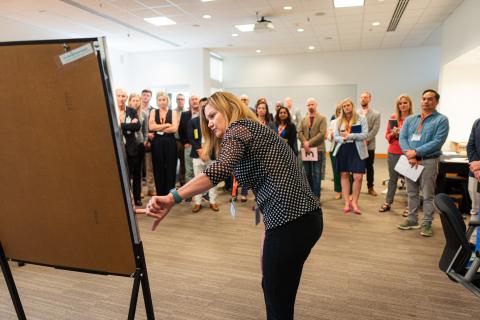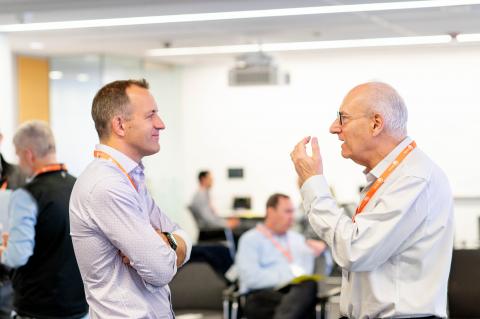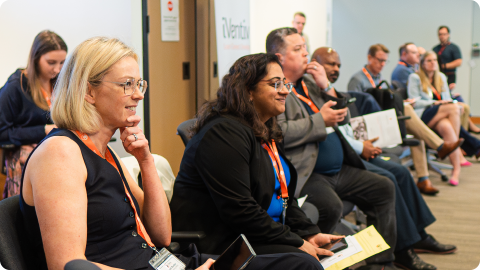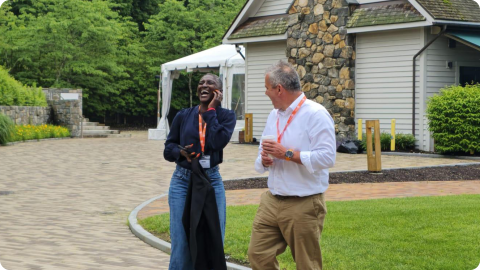Hannah Hoey (Research & Content Executive, iVentiv) took some time to dive into the dynamic world of Learning & Development (L&D) at Fugro, spearheaded by Wouter Jan Kleinlugtenbelt, the Global Head of L&D.
During this conversation, Wouter talked about Fugro’s transformative journey, adapting to cutting-edge technologies like uncrewed vessels and augmented reality, with the aim of enhancing operational excellence.
In this interview, we’ll explore how Fugro integrates L&D with its strategic goals to ensure its workforce is not only skilled but prepared to meet the future demands of the geo-data engineering industry. Join Wouter Jan to uncover the intricacies of Fugro’s L&D strategies, from onboarding new hires to fostering a culture of continuous Learning & Development.
Wouter’s Work at Fugro
Wouter Jan, as Global Head of L&D at Fugro, is significantly involved in the company's strategy to expand and evolve its business, aligning closely with its geo-data engineering core. A primary challenge is growing the workforce, necessitating, he says, extensive training for new hires in both technical and business roles to quickly become competent.
In addition to this, Wouter Jan talks about Fugro’s current transformation towards utilising uncrewed vessels and remote operations, which demands a shift in skill sets from traditional field roles to more digitally-focused capabilities – a transformation that involves reskilling the current workforce and attracting new talent with expertise in technology and digitalisation, critical for the company’s adaptation and future success.
How is Fugro adapting L&D offerings for future success?
Wouter Jan tells us that, at Fugro, simulators are extensively used, akin to those for aircraft pilots, to prepare staff for unexpected situations in a controlled environment. These simulations play a crucial role in the L&D strategy, particularly in training for remote operations and uncrewed vessels.
Simulations aren’t the only form of training offered at Fugro; Wouter Jan explains that the company also utilises a physical training center in Plymouth, UK, where technical staff undergo intensive four-week bootcamps - sessions that are essential for hands-on experience with equipment, effectively complementing the simulation training.
Fugro’s blend of simulation and practical training, he says, ensures staff not only gain the necessary skills but also acquire a deep familiarity with the technology and tools they will use, enhancing their competence and readiness for field operations.
Recruitment, Onboarding and Retention: Fugro’s Talent Journey
Wouter Jan goes on to say that, at Fugro, the talent journey integrates closely with onboarding and training as part of a broader L&D strategy that connects with various HR functions. The company's L&D initiatives are not isolated but interlinked with the wider HR framework to support both talent acquisition and retention.
Collaboration he believes, is key, with the Talent Acquisition Director responsible for workforce and strategic planning, which directly influences L&D demands. The Talent & Leadership Director then focuses on employee engagement and investigates reasons behind voluntary departures, assessing if these are related to development opportunities or career progression.
This holistic approach, Wouter emphasises, ensures that Learning & Development is aligned with the company’s immediate needs and future goals, enhancing the overall impact of HR functions within Fugro.
HR as a Critical Business Partner, and the role of Marketing L&D
For Wouter Jan, HR's evolution into the role of crucial business partner is intertwined with the significant role of marketing for L&D initiatives at Fugro.
L&D, Wouter Jan begins, has transcended its traditional HR confines, emphasising a holistic development approach across technical, leadership, and generic skills. This strategic alignment with HR allows for a comprehensive understanding of workforce needs and tailored training programs.
Fugro's L&D communication strategies have shifted from a passive "spray and pray" dissemination of available courses to a more proactive marketing approach, involving explaining the relevance of learning solutions to the company’s strategic goals and individual career paths, effectively engaging employees in their professional development.
The emphasis here is on storytelling and contextual marketing, making training opportunities more relatable and directly connected to personal and business outcomes, thus driving both individual growth and organisational success.
The Role of the LMS and Fugro’s Mission to Go Beyond
At Fugro, the Learning Management System (LMS) plays a supportive, albeit non-central role in the company's L&D transformation. The LMS is primarily used as a system of records and supports various processes within Fugro.
However, the priority for the company lies beyond the digital confines of the LMS. It focuses more on direct communication and role-based offerings tailored to specific business needs. The emphasis, Wouter says, is on ensuring that L&D initiatives are strategically relevant and closely aligned with business objectives.
Why?
This, Wouter answers, is an approach that includes maintaining close business proximity, which helps L&D professionals become trusted advisors by deeply understanding the business cycles and challenges.
Fugro's strategy integrates digital learning solutions with real-world knowledge from experienced technical trainers, enhancing the overall learning experience and ensuring safety and competence in high-risk environments.
Wouter’s role as Coach, and What He Considers Key Leadership Pillars
Wouter Jan has significant experience coaching leaders, particularly in the L&D sector. During our talks with him, he emphasised the importance of several key pillars for leadership development within this field:
- The necessity of aligning L&D departments closely with business objectives to ensure their actions are business-relevant and not operating in silos. This includes integrating L&D with wider HR functions like workforce planning, talent acquisition, and engagement.
- Governance is another crucial area, focusing on maintaining ongoing dialogues with key stakeholders and participating actively in business review meetings. An approach that Wouter Jan believes ensures that L&D efforts are aligned with operational excellence and have a tangible impact on business unit goals.
Overall, Wouter Jan views these strategies as essential for L&D leaders to effectively drive change and influence organisational outcomes in a dynamic business environment.
Looking to the Future of L&D
Wouter Jan is excited about the transformative potential of new technologies like augmented reality (AR) in the Learning & Development sector over the next couple of years.
As part of an engineering company, he is particularly focused on integrating L&D with operational excellence, which includes fostering a community of practice that bridges Operations, Learning, and Knowledge Management.
He anticipates that these developments will contribute significantly to creating a holistic ecosystem within Fugro, supporting its substantial growth and transformation.
Frequently Asked Questions
What are the key leadership pillars necessary for effective Learning & Development governance?
Key leadership pillars include aligning L&D efforts with business objectives, maintaining ongoing dialogues with stakeholders, and ensuring that L&D initiatives contribute positively to operational excellence and business unit goals.
How can Learning Management Systems (LMS) be optimised beyond record-keeping?
Beyond record-keeping, LMS can be optimised by using them to deliver tailored training programs, support real-time feedback, and facilitate easier access to learning resources that are directly aligned with employees' roles and business needs.
What challenges do organisations face when marketing Learning & Development initiatives internally?
The main challenges include ensuring the relevance of learning opportunities to employees' career paths, effectively communicating the benefits, and engaging employees in a way that motivates them to participate actively in these initiatives.
How does practical training complement simulations in Learning & Development programs?
Practical training provides hands-on experience with actual equipment and scenarios, which is vital for reinforcing skills learned through simulations. This combination ensures that employees are not only familiar with theoretical knowledge but are also competent in real-world applications.
What role do simulations play in modern Learning & Development strategies?
Simulations are crucial for preparing employees for unexpected situations in a controlled environment, particularly in industries requiring high precision and safety. They help staff practice and master complex tasks, which is essential for remote operations and the use of sophisticated machinery.









